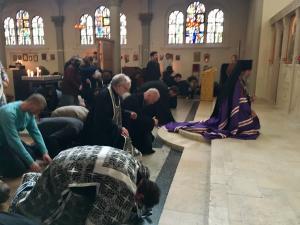
Forgiveness is central to the Christian faith. Not only are we its recipients, we are expected to follow the example given to us by God and forgive others. With God, who is love, justice is bound with mercy. Forgiveness is available to all, but if we are to receive it, we must make ourselves vessels of mercy, offering the mercy we receive to others. Forgiveness is so important that the service which begins the Great Fast, Lent, in the Byzantine tradition, is Forgiveness Vespers; in it, everyone in the community, including the priest, comes together asking for and receiving forgiveness for whatever offenses they might have done. This reminds us the spirit which we should have in and with the Great Fast itself: we must hold onto mercy instead of legalism, putting mercy at the forefront of the fast while we work to undermine any and all of our inclinations which would lead us away from the charity which we should possess:
For salvation is nearer to us now than when we first believed; the night is far gone, the day is at hand. Let us then cast off the works of darkness and put on the armor of light; let us conduct ourselves becomingly as in the day, not in reveling and drunkenness, not in debauchery and licentiousness, not in quarreling and jealousy. But put on the Lord Jesus Christ, and make no provision for the flesh, to gratify its desires (Rom. 13:11b-14 RSV)
The further along we are in our spiritual journey, the closer we should be to the perfection expected of us, a perfection which is manifest in turning ourselves into people who act and react out of pure love. But until we reach that perfection, we must press on, overcoming those inordinate passions which would lead us away from Christ. To become closer to Christ we must become more and more like him, following him in his example of love. Forgiveness is key. If we forgive others, and show them love, we will find ourselves becoming more and more united with them; quarrels and jealousies will vanish because the source and foundation for such conflicts will be removed. Jesus forgave his persecutors; it is a difficult example to follow, but the more we pursue our own spiritual transformation, the more we take on love and overturn those impulses within which would lead us away from such love, the more we will follow that example and practice forgiveness and freely grant it to all. It is in this fashion we shall find ourselves becoming less and less judgmental, replacing our judgmental spirit with one filled with love. A judgmental spirit is one which looks for something to condemn in others, while a loving one looks for what is good in them to lift up and perfect them. The more we realize how much we have been forgiven our own indiscretions, our own imperfections, our own mistakes, the more we realize others likewise deserve such mercy and should be treated by us as we have been treated by God. If, on the other hand, we see those with little to no faith and judge them harshly, we find that we have gone against the mercy of God, and so by trying to condemn them, we risk being the ones who are denied mercy ourselves:
As for the man who is weak in faith, welcome him, but not for disputes over opinions. One believes he may eat anything, while the weak man eats only vegetables. Let not him who eats despise him who abstains, and let not him who abstains pass judgment on him who eats; for God has welcomed him. Who are you to pass judgment on the servant of another? It is before his own master that he stands or falls. And he will be upheld, for the Master is able to make him stand (Rom. 14:1-4 RSV).
If we truly have embraced the mercy contained in forgiveness, we will receive that forgiveness ourselves; if, we have not embraced it, we cut ourselves off from it. This is not because God is unwilling to forgive, but because we cut ourselves off from that forgives, not willing to receive it in ourselves and make it a part of who we are. The one who has received mercy will be transformed by it and will reflect that mercy in what they do, while the one who has not allowed it to transform them, and so show no mercy, no forgiveness, to others, show they have yet to truly welcome it into their lives. This is how we can understand Jesus when he warned us, “For if you forgive men their trespasses, your heavenly Father also will forgive you; but if you do not forgive men their trespasses, neither will your Father forgive your trespasses” (Matt. 6:14-15 RSV). Those who are unwilling to receive forgiveness in their lives and incorporate it in themselves will not have it. The Father is always willing to forgive, but it is up to us to receive it and make it a part of us. Thus, the more we fight against those inordinate passions which know no mercy, and hence, no forgiveness, the more we will receive mercy and forgiveness, making us vessels of such grace to others.
The more we forgive others, the more we are open to forgiveness ourselves; the more we admit we need forgiveness for various things we have done, the more we open ourselves up to forgiveness and receive it. The more we receive it, the more we realize the situation of others and will be merciful to them. The Great Fast helps us embrace all the elements of forgiveness. We are shown we are to forgive others and in the process receive our own forgiveness. We are to see that sin can and still should be judged, but the judgment should be the judgment of love, one which looks to help instead of hinder those who have been defiled by sin. We fast, not for the sake of glory, but for self-control, for when we are in control of ourselves, we will not let trivial things get in the way of love and the path of love. Love will build us up, and as it does so, we will be transformed, becoming vessels of love and grace who will seek to help and build others up (on their own terms, not ours). It all begins with forgiveness. We must forgive each other, reminding each other that not only do we forgive them, but God forgives them, and in doing so, we truly lift each other up so that we all can be transformed by the mercy and grace of God.
Stay in touch! Like A Little Bit of Nothing on Facebook.
If you liked what you read, please consider sharing it with your friends and family!













